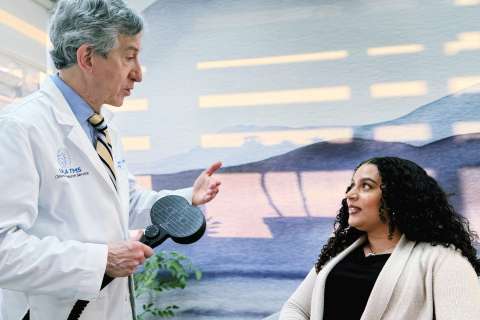The David Geffen School of Medicine at UCLA and the UCLA Henry Samueli School of Engineering and Applied Science have formed a new center whose mission is to improve the quality and reliability of new health care technologies, reduce the length and cost of hospital stays, and allow more patients to heal in their own homes.
The UCLA Center for Systematic, Measurable, Actionable, Resilient and Technology-driven Health, or Center for SMART Health, will foster collaboration among engineers, computer scientists, clinicians, biomedical researchers and information technologists. Researchers will develop and test health care devices and systems — including mobile technology, big data analytics, screening technologies and medical robotics — in order to address challenges in the way health care is delivered.
The center’s first project, called the SMART Home Lab, is a mock residence where researchers can simulate patients’ responses to treatment and the reliability and resilience of home health sensors. The lab is in UCLA’s Engineering VI building.
Other projects, to be based at the Geffen School, will focus on a range of diagnostic and treatment technologies.
The center’s co-directors are Dr. Arash Naeim, an associate professor of medicine and the Geffen School’s chief medical officer for clinical research, and Majid Sarrafzadeh, a distinguished professor of computer science and electrical engineering at UCLA Engineering, and a co-founder of the UCLA Wireless Health Institute. Both are members of UCLA’s B. John Garrick Institute for the Risk Sciences.
“The fundamental and applied research performed in the SMART Health Center could have an unprecedented impact on care,” Sarrafzadeh said. “The flexibility, adaptability and mobility of wearable and remote health systems enable effective monitoring and delivery of information to patients without requiring time-consuming and costly clinical visits. In addition, predictive analytics is revolutionizing decision making that can improve health care and quality of life.”
Naeim, who also is an associate director of the Clinical and Translational Science Institute at UCLA and a researcher in aging and cancer at UCLA’s Jonsson Comprehensive Cancer Center, said the new effort will be strengthened by cooperation between the schools.
“UCLA has some of the greatest medical and engineering minds in the world, and the SMART Health Center represents a great opportunity for them to collaborate on solutions to some of the biggest challenges in health care delivery,” he said. “The SMART Health Center will be a real game changer for UCLA, and it will open the door to innovative joint ventures with technology companies and the health care industry.”



